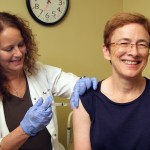
Emory doctors discuss H1N1 flu vaccine testing
Clinical trials are underway at Emory and Children’s Healthcare of Atlanta testing an investigational H1N1 flu vaccine along with the seasonal flu vaccine. Emory will enroll about 100 children, ages six months to 18 years, and up to 650 children nationally will participate in the study.
The study will look at the safety of and measure the body’s immune response to the H1N1 flu vaccine. In addition, it will help determine how and when the vaccine should be given with the seasonal flu vaccine to make it most effective.
Another important factor is learning if there are any potential problems by giving the vaccines together, such as whether one vaccine will undermine the protective power of the other.
The answer is important because experts are predicting that both strains of flu will circulate this fall and winter.
The clinical trial is part of the Vaccine and Treatment Evaluation Units (VTEUs), supported by the National Institute of Allergy and Infectious Diseases (NIAID) of the National Institutes of Health (NIH). At Emory, this team is led by Mark Mulligan, MD, executive director of the Hope Clinic of the Emory Vaccine Center.
The Emory pediatric clinical trial is taking place at the Emory-Children’s Center. It is led by Emory VTEU co-directors Harry Keyserling, MD, professor of pediatric infectious diseases at Emory School of Medicine and Paul Spearman, MD, chief research officer for Children’s Healthcare of Atlanta and vice chair of research for Emory’s Department of Pediatrics, along with Allison Ross, MD, Emory assistant professor of pediatric infectious diseases.
Keyserling says that because children and young adults are considered among the most vulnerable populations for new and emerging strains of influenza, such as the current H1N1 pandemic, it is critically important that testing for a vaccine is quick and efficient.
The pediatric trial follows the launch of a VTEU-led adult clinical trial of the H1N1 and seasonal flu vaccines, which began at Emory’s Hope Clinic on Aug. 10 and will continue with followup visits for the next six weeks by a group of more than 170 volunteers.







 A new method of rapidly producing highly targeted monoclonal antibodies could soon be used to rapidly diagnose H1N1 influenza. Just a month after vaccinating people with a seasonal flu vaccine, the researchers were able to use just a few tablespoons of the vaccinated individuals’ blood to generate antibodies against that specific strain of flu. The
A new method of rapidly producing highly targeted monoclonal antibodies could soon be used to rapidly diagnose H1N1 influenza. Just a month after vaccinating people with a seasonal flu vaccine, the researchers were able to use just a few tablespoons of the vaccinated individuals’ blood to generate antibodies against that specific strain of flu. The